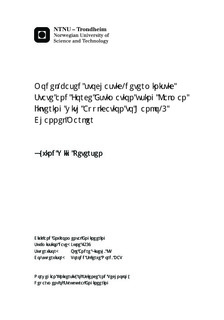Model-based stochastic-deterministic State and Force Estimation using Kalman filtering with Application to Hanko-1 Channel Marker
Master thesis
Permanent lenke
http://hdl.handle.net/11250/2353874Utgivelsesdato
2014Metadata
Vis full innførselSamlinger
Sammendrag
Force identification in structural dynamics is an inverse problem concerned with finding loads from measured structural response. The main objective of this thesis is to perform and study state (displacement and velocity) and force estimation by Kalman filtering.Theory on optimal control and state-space models are presented, adapted to linear structural dynamics. Accommodation for measurement noise and model inaccuracies are attained by stochastic-deterministic coupling. Explicit requirements for discrete time-invariant steady filter convergence are derived. From a finite element model and measurement data, unbiased estimation of state and force history is performed by an augmented Kalman filter, based on minimizing error variance.
A numerical example on a system with two degrees of freedom displays adequate filtering capabilities. Experimental validation is performed on a simply supported beam instrumented with accelerometer and three strain gauges. The studies demonstrate successful identification of impact forces with both collocated and non-collocated sensors. The corresponding state estimation displays good accuracy. Limiting the number of measurements is tested. The minimal observation setup (one accelerometer and one strain gauge) is analytically stable, but results are found to be significantly deteriorated, even with collocation. Moreover the influence of model errors is investigated, imposed as random contributions in mass and stiffness matrices. The estimation of impact forces and states show fair robustness against moderate mass and stiffness deviations.
A short case study on the offshore Hanko channel marker is presented, exposed to moving sea ice. A finite element model is created, instrumented with a tiltmeter and three accelerometers. Numerical simulations show identification of ice forces is viable, but heavily relies on the model representation accuracy.
